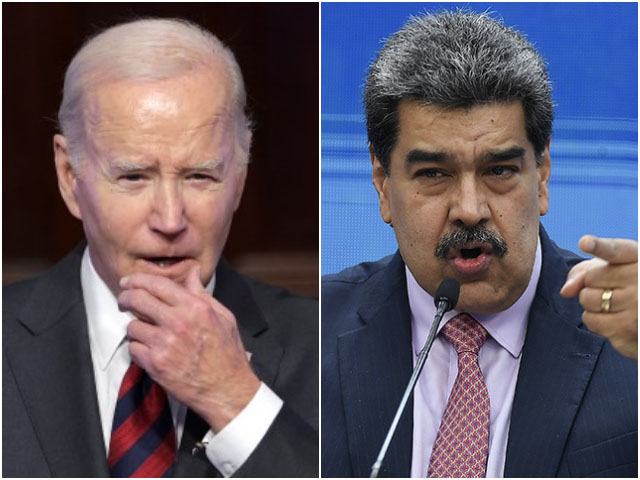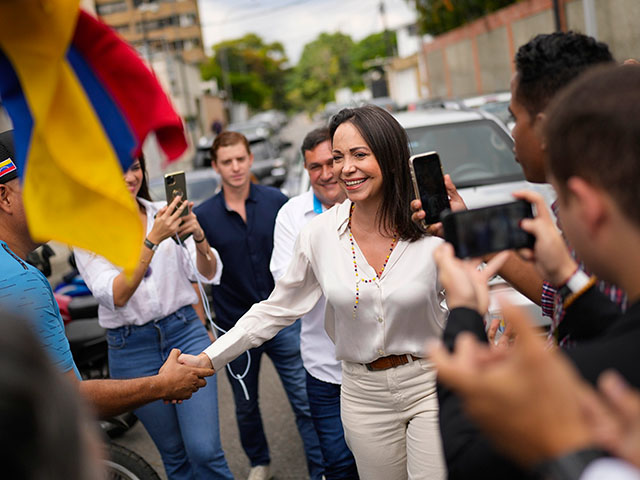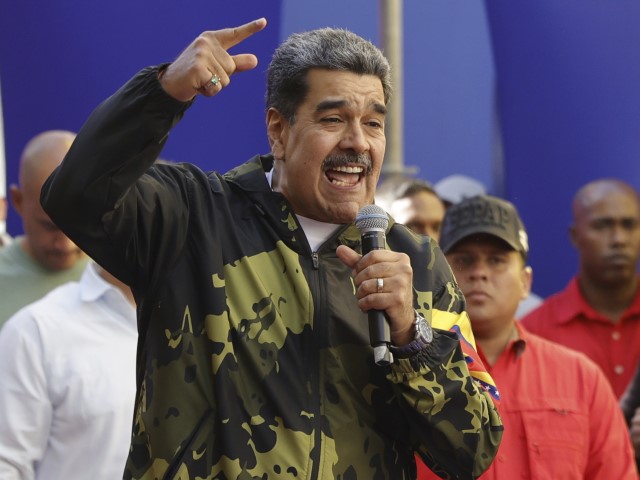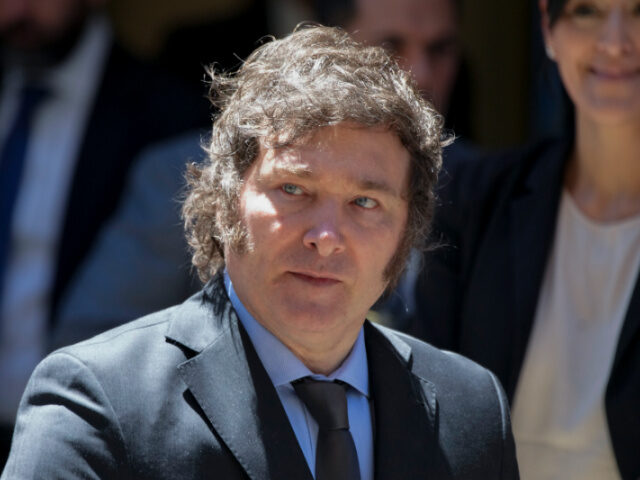Argentine President Javier Milei asserted in an interview on Sunday that he “would not have any problem” imposing diplomatic sanctions against Venezuela’s socialist regime, suggesting he would be willing to convince other countries to support similar measures.
Milei made his assertion in a prerecorded interview broadcast by CNN en Español on Sunday evening.
In the interview with journalist Andrés Oppenheimer, Milei – a staunch anti-communist and anti-socialist, who has fiercely condemned Latin America’s authoritarian regimes throughout his career as both a TV fixture and politician – was asked who the “worst presidents” in Latin America are.
The Argentine president answered with Venezuelan dictator Nicolás Maduro, the “communism that [Colombian far-left President Gustavo] Petro wants to push,” and the Nicaraguan and Cuban dictatorships.
“Those are the worst of it, they are truly despicable,” Milei said.
Oppenheimer asked Milei what Latin American countries can do to promote democracy in Venezuela and if he is contemplating sanctions against the Maduro regime.
“For the moment, we have made an advance, that they’re being condemned. For example, here the previous government had not condemned any of those dictatorships,” Milei answered. “So for starters we make an emphatic condemnation, we raise those banners everywhere, and obviously if there were to be sanctions, I would not have any kind of problem [with that].”
Asked if he would encourage other countries to adopt sanctions, Milei answered, “Yes.”
“I would be willing to do it because the carnage that is Venezuela is truly unheard of, the same as the island prison of Cuba,” he answered.
Milei’s statements come at a time when the rogue socialist regime is handsomely benefitting from a broad oil and gas sanctions relief package granted by the administration of U.S. President Joe Biden in October.

U.S. President Joe Biden speaks about supply chain resilience during an event with members of his cabinet and administration in the Indian Treaty Room at the Eisenhower Executive Office Building on November 27, 2023, in Washington, DC. (Alex Wong/Getty) //Nicolas Maduro, Venezuela’s president, speaks during a press conference at Miraflores Palace in Caracas, Venezuela, on Wednesday, Nov. 30, 2022 (Matias Delacroix/Bloomberg via Getty Images).
The sanctions relief allows the Maduro regime to once again freely sell Venezuelan oil in U.S. and international markets, effectively restoring the ruling socialists’ main source of revenue.
The Maduro regime received the sanctions relief package in exchange for making a series of vague promises to hold a “free and fair” presidential election in 2024. The electoral promises were part of the “Barbados Agreements,” a document signed by the Maduro regime and the Venezuelan opposition under the supervision of the Biden administration.
Socialist dictator Nicolás Maduro not only failed to uphold his word, repeatedly violating the terms of the agreement; he replaced it with an entirely separate sham electoral agreement shortly thereafter. Maduro ordered the socialist-controlled National Electoral Council (CNE) to organize a sham presidential election on July 28 where only handpicked collaborationists and regime-approved “opposition” candidates will be allowed to run.
Opposition frontrunner candidate María Corina Machado remains banned from running for public office. Her substitute candidate, 80-year-old academic Corina Yoris, was not allowed to register her candidacy despite her eligibility to run according to Venezuelan law, effectively leaving the Venezuelan electorate with no actual opposition candidate on the ballot.

Supporters greet opposition presidential hopeful Maria Corina Machado as she arrives at a polling station to cast her ballot during the opposition primary election in Caracas, Venezuela, Sunday, Oct. 22, 2023. The opposition will pick one candidate to challenge President Nicolás Maduro in 2024 presidential elections (AP Photo/Matias Delacroix).
Prior to Milei taking office in December, Argentina was led by socialists governments for 16 of the past 20 years. Venezuela’s socialist regime maintained friendly relations with Argentina during the previous 16 years of socialist rule, with the administration of former President Mauricio Macri (2015-2019) being the only exception.
Socialist dictator Nicolás Maduro began to strain the relationship almost immediately after Milei was elected president in November 2023, repeatedly accusing Milei of being a “neo-Nazi.” Maduro is yet to provide proof substantiating his repeated accusations against Milei, who has enthusiastically expressed support for Israel on numerous occasions.
The Maduro regime also accused Argentina of “stealing” a cargo plane linked to a U.S-sanctioned Iranian airline that operated under Venezuela’s state-owned Conviasa line, also sanctioned by the United States. Argentina seized the plane in 2022 during the socialist administration of former President Alberto Fernández, Milei’s predecessor.
Last week, Argentina denounced that the Maduro regime cut power and water utilities to the official residence of the Argentine ambassador in Caracas after Argentina agreed to shelter six Venezuelan dissidents close to opposition leader Machado.

Venezuela’s President Nicolas Maduro speaks during an event marking the anniversary of the 1958 coup that overthrew dictator Marcos Perez Jimenez, in Caracas, Venezuela, Tuesday, Jan. 23, 2024 (Jesus Vargas/AP).
Shortly after the incident occurred, the Argentine government decided, in accordance with international law, to send Argentine Gendarmerie officials to Caracas to reinforce the embassy’s safety. The Maduro regime denied the request, prohibiting the entry of the gendarmes and leaving the embassy without proper security.
“It is a serious issue that they do not let an Argentine force enter to protect the embassy. Now, the total and absolute responsibility is in the hands of the Venezuelan police forces,” Argentine Security Minister Patricia Bullrich told Infobae. “I hope nothing happens, but if it does, they will be responsible.”
Christian K. Caruzo is a Venezuelan writer and documents life under socialism. You can follow him on Twitter here.

COMMENTS
Please let us know if you're having issues with commenting.